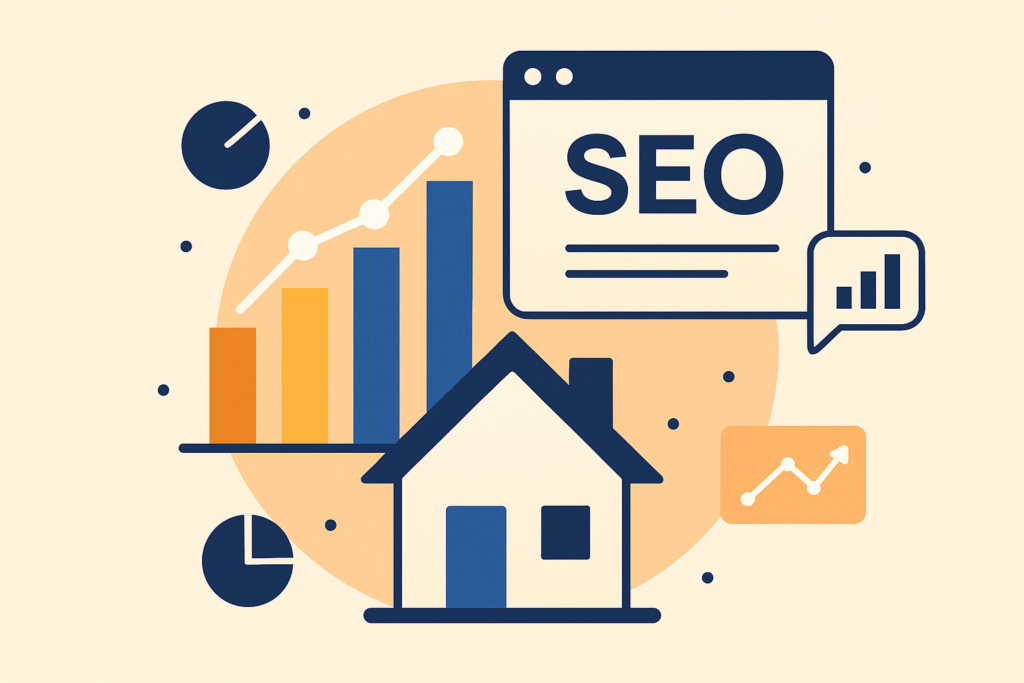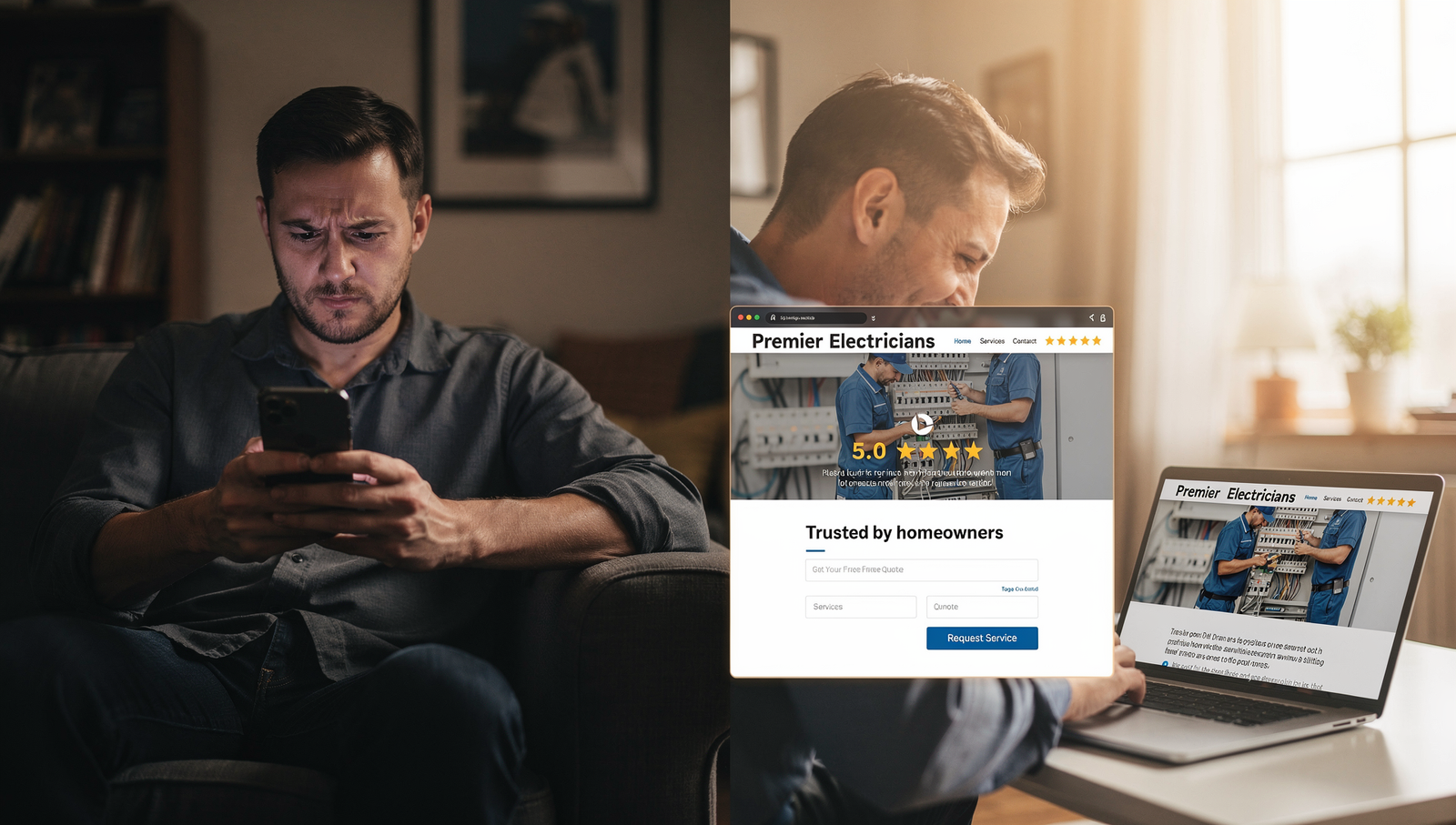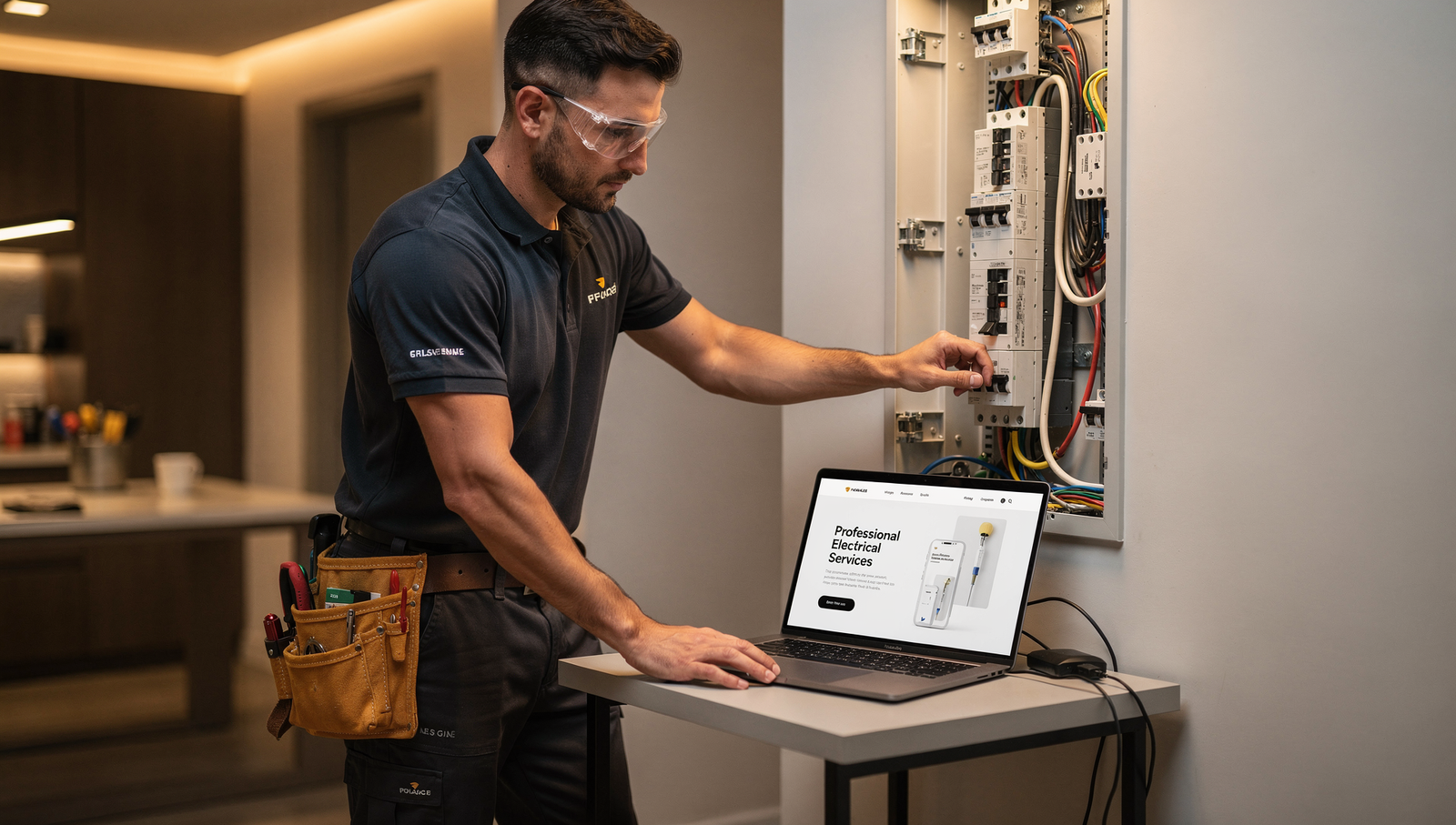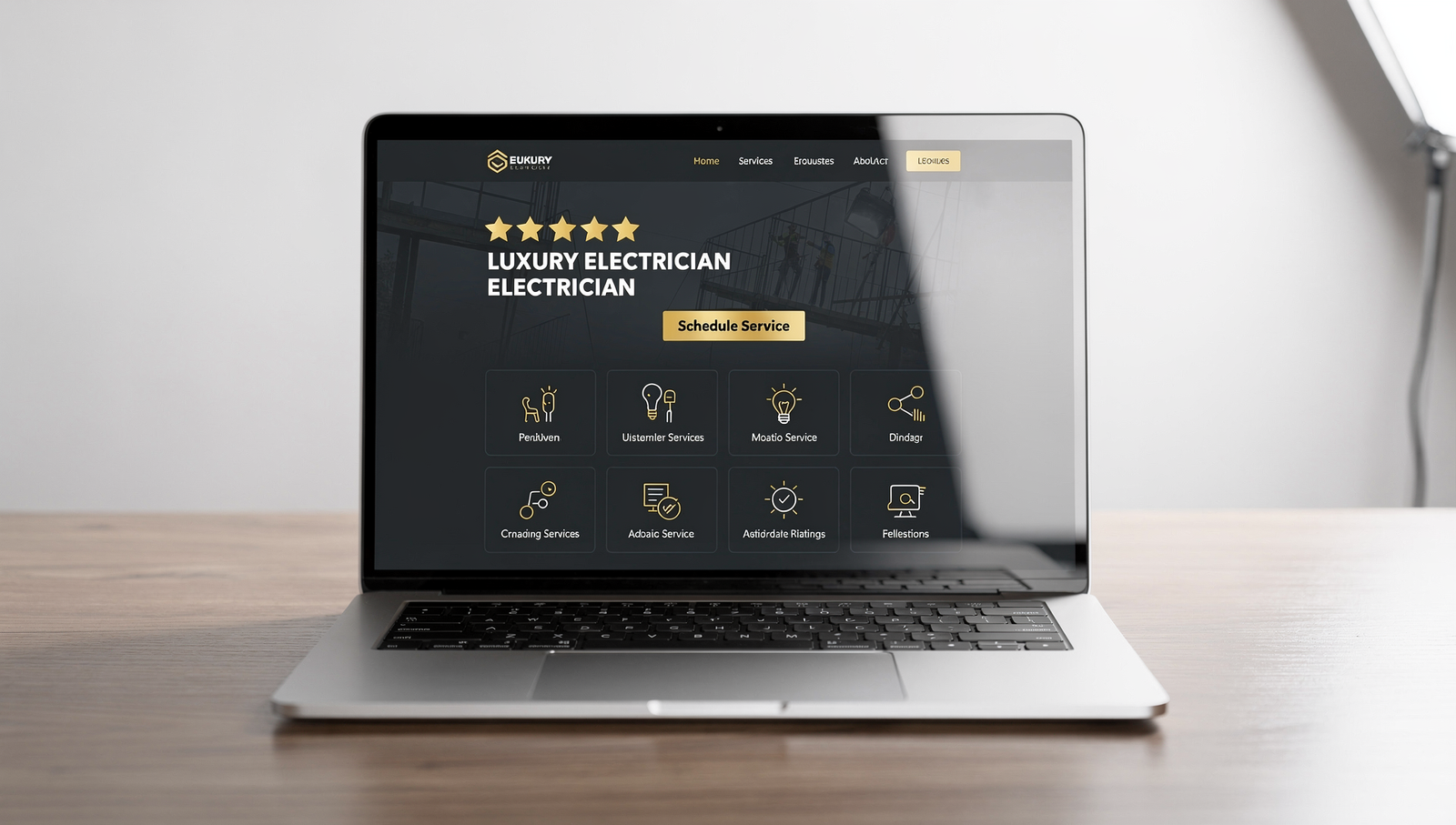7 Ways to Write Real Estate Blog Posts People Actually Read
The tricks in this video and blog post will give you the exact strategy to create endless real estate blogs that your clients read to maximize SEO
Want More Clients Fast?
Steal This Website Rescue Kit to Get More Clients, More Calls, and More Sales on Autopilot
In today’s digital market, blogging isn’t a nice-to-have. It’s a core driver of business. Nearly all home buyers begin their property search online, and strong search engine optimization (SEO) can account for more than half of a real estate site’s visitors. Even better, email marketing often converts far better than social media, so great blog posts play directly into high-converting newsletters. When you add them all up, a strategic blog can be your brand’s most powerful marketing engine.
At Digital Dream Homes, we build luxury websites for real estate agents, and we’ve seen firsthand how high-quality blog content helps agents shine in competitive markets. Let’s explore how to craft posts that attract leads, educate clients, and make search engines happy…with a sprinkling of nerdy humor and real-world examples along the way.
Understand Why Blogging Matters
Blogging is more than filling space on your website. Done right, it:
Builds brand awareness and helps you stand out. When prospective clients read your articles, you’re no longer a faceless name…you’re a voice they recognize.
Positions you as an authority by sharing useful insights, which builds trust.
Educates clients on topics like financing, staging, and market trends. A well-informed reader is far more likely to choose you as their agent.
Generates leads by attracting people who are actively searching for answers. Offer helpful resources in exchange for contact details.
Boosts SEO…search engines reward fresh, keyword-rich content.
Think of your blog as your digital handshake. Whether you’re writing about local pricing trends in Raleigh or explaining how to buy a condo with low down payment, you’re showing prospects that you care enough to share your knowledge.
Pick a Niche and Know Your Audience
Imagine walking into a bookstore where every section is labeled “Books.” It’s overwhelming. Real estate blogging is similar: a blog about “all real estate topics everywhere” rarely catches anyone’s eye. Narrow your focus to a specific subcategory that appeals to your clientele. Some examples:
Luxury homes and design inspiration
First-time buyer guides for your city
Investment properties and flipping tips
Eco-friendly homes or smart home tech
Neighborhood spotlights and lifestyle posts
Consider who you’re writing for. Are you speaking to seasoned investors, young professionals, retirees, or perhaps cat-loving families who want scratch-resistant flooring? (We don’t judge…just make sure you address their needs.) This clarity lets you tailor your language and examples accordingly.
Do Your Keyword Research (Without Stuffing)
SEO may sound intimidating, but think of it like a treasure map that leads searchers to your blog. The easiest way to start is with Google’s suggestions. Type in a broad term like “selling a home” and note the additional phrases, such as “selling a home calculator,” “selling a home capital gains,” and “selling a home with solar panels.” These are real search queries you can build posts around.
Some simple rules:
Make a list of keywords and topics your audience might search.
Use your primary keyword in the title, the first 150 words, and at least one subheading.
Avoid keyword stuffing…jamming ten variations of a phrase into a paragraph will annoy readers and hurt your SEO.
If you’d like a deeper dive into SEO, check out our post on Real Estate SEO Best Practices…it pairs nicely with a cup of coffee and a spreadsheet.
Why SEO Matters
A little data goes a long way. Organic search often contributes more than half of all visitors to real estate websites. Better yet, organic search tends to convert higher than paid search, bringing in more qualified leads without breaking the bank. In fact, return on investment from SEO can be far greater than from PPC ads or webinars.
If you’re ready to make SEO work for you, check out Top 7 SEO Mistakes Realtors Make — and Exactly How to Fix Them.
Craft Catchy Headlines and Introductions
Your headline is your first impression. It should promise value, evoke curiosity, and include your keyword. Compare these two titles:
“Real Estate Tips for Buyers”
“7 Smart Ways Chiang Mai First-Time Buyers Can Save on Closing Costs”
The second one is specific, benefits-focused, and more likely to earn a click.
Once you’ve hooked readers, open with a compelling introduction. Tell a short anecdote, ask a question, or share a surprising stat. For example: “Did you know that listings with video get significantly more inquiries? In this post, you’ll learn how to showcase your listings like a Hollywood director on a budget.” Humor and relatability can turn a casual reader into a loyal follower.

Structure for Humans and Search Engines
Great blogs feel like a conversation, not a textbook. Use short paragraphs, descriptive subheadings, and bullet points. Readers skim; guide their eyes with clear signposts.
Include internal links to other posts on your site…for example, Best Website Layout for Realtors dives deeper into visual hierarchy and site flow, while Real Estate Website Conversion Tips explains how to turn casual browsers into serious leads.
Visuals matter too. Articles packed with text are hard on the eyes. Video, photography, and infographics keep visitors engaged longer. For help making your site more engaging, read Virtual Tours and SEO.
When planning your posts, consider this format:
Hook (headline and introduction)
Problem (pain point or question)
Solution (your expert advice with examples)
Next Steps (actionable tips)
Call to Action (invite readers to subscribe or contact you)
This format helps both search engines and humans understand your message. For layout tips, check out Real Estate Landing Page Optimization.
Adopt a Friendly, Approachable Tone
Professional doesn’t have to mean stiff. Readers appreciate a casual, warm tone and even a bit of humor. Pretend you’re explaining a concept to a friend. Rather than saying “It is imperative to engage the services of a qualified inspector,” try “Always bring in a trusted inspector…even if your uncle thinks he can spot termites with his Jedi senses.”
Nerdy humor can help break up dense topics. Feel free to insert a Star Wars reference when explaining mortgage amortization schedules, or compare market volatility to a roller coaster. Authenticity wins hearts and organic shares.
Provide Genuine Value
Your blog should solve problems. Address frequently asked questions, demystify processes, and share insider tips. Don’t just repeat info found elsewhere; add your unique perspective.
Here are some topics that typically resonate:
Neighborhood guides and market updates: Buyers care about community. Use data to highlight schools, commute times, and amenities.
How-to guides: Explain complex processes like staging, financing, and inspections.
Client success stories: These build trust and show proof of results.
For example, telling sellers that listings with professional photos sell faster makes a strong case for your marketing process. Dive deeper with 10 Ways a High-End Website Helps You Close More Listings.
Embrace Multimedia and Visual Storytelling
Modern buyers expect more than text. As mentioned, video boosts engagement and conversion rates dramatically. Consider embedding:
High-resolution listing photos
Virtual tours
Video walkthroughs
Infographics and charts
Keep your load times fast by compressing images and hosting videos off-site when needed. For creative inspiration, read Real Estate Video Background Websites.
Share and Promote Your Content
Writing is only half the battle. To see results, you need to distribute your blog posts where your audience spends time.
Here’s how to promote effectively:
Post on your social channels: Facebook, Instagram, LinkedIn, and YouTube.
Send email newsletters to your contact list.
Engage with comments and feedback.
Repurpose blog snippets into short videos, reels, or stories.
Want help getting organized? Our post on Email Marketing for Real Estate Agents and Social Media Strategies for Real Estate Agents will help you schedule and systemize.
Measure Your Success and Iterate
Track how each post performs so you can refine your content calendar. Watch metrics like:
Page views
Time on page
Bounce rate
Social shares
Conversion rate
Search rankings
Experiment with different styles, titles, and multimedia. You might discover that how-to content performs best on Google while market updates do better on Facebook. Let the data guide your strategy.
A Final Word (and a Friendly Invitation)
Writing a real estate blog post is part strategy, part storytelling. When you know your audience, write with warmth, and optimize with intention, you’ll build a blog that generates leads and grows your business long after you hit “publish.”
If you’re ready to elevate your brand with a high-converting site and custom content strategy, we’ve got your back. At Digital Dream Homes, we don’t just build beautiful websites…we help realtors attract better leads and close more deals. Explore more with our blogs on Luxury Real Estate Website Design, Real Estate Blog Post Ideas, and Guide to Real Estate Marketing Automation. Then, book your free consultation and let’s turn your online presence into your most powerful sales tool.
Matt Pieczarka
Want a Free Website Audit?
Fill out your information below and we will send you a personal screen share video of tips on how to make your actual website better!
Other Posts You Might Like…
- Free SEO Tracking Tools for Small Business That Actually Work
- How Long to Rank Small Business Website on Google? The Real Timeline
- Importance of Google Reviews for Small Business: Rank Faster, Earn Trust
- SEO Mistakes Small Business Owners Make: Fix These Fast
- SEO Blogging Tips For Small Business: Write Posts That Rank
- Backlinks for Small Business Websites: Why Backlinks Matter for Local Businesses
- On-Page SEO Checklist for Small Business Websites
- Google Business Profile Setup for Small Business: The Beginner’s Guide
- Local SEO for Small Businesses: Tips for Small Business Owners
- What is a Listicle and Why Your Website Needs One
9 Functional Medicine Website Designer Tips to Grow Faster
9 Functional Medicine Website Designer Tips to Grow Faster Watch the video to learn one psychological SEO trick to build more trust and get more leads from your website! Wan
7 Functional Medicine Website Design Moves That Get Patients
7 Functional Medicine Website Design Moves That Get Patients Watch the video to learn about the best layout to get more leads and patients guaranteed! Want More Clients Fast
11 Electrician Website Designers That Turn Clicks Into Calls
11 Electrician Website Designers That Turn Clicks Into Calls Watch the video to learn the best layout for best results! https://youtu.be/XaEbNPZxi0U?si=kT1Cru8S2SMJSPNx Want More C
11 Electrician Website Help Fixes That Turn Clicks Into Calls
11 Electrician Website Help Fixes That Turn Clicks Into Calls Watch the video to learn how to structure your website for the best return on investment! https://youtu.be/XaEbNPZxi0U
11 Electrician Web Design Company Questions to Ask
11 Electrician Web Design Company Questions to Ask Watch the video to learn the best website layout for the most lead conversions! https://youtu.be/XaEbNPZxi0U?si=SgxjOWdd7F6f4Mtg
13 Electrician Website Templates That Turn Clicks Into Paid Jobs
13 Electrician Website Templates That Turn Clicks Into Paid Jobs Watch the video to learn the best template layout for the best results! https://youtu.be/XaEbNPZxi0U?si=rGg1WlUWlmH
11 Electrician Website Services That Bring In More Calls
11 Electrician Website Services That Bring In More Calls Watch the video to learn the best website layout for the best results https://youtu.be/XaEbNPZxi0U?si=rGg1WlUWlmHTg73v Want
12 Electrician Website Upgrades That Win More Jobs
12 Electrician Website Upgrades That Win More Jobs Watch the video to learn the best website layout to get the most bang for your buck! https://youtu.be/XaEbNPZxi0U?si=uFqsnSFvenQ1
5 Electrician Website Design Company Upgrades That Win Jobs
5 Electrician Website Design Company Upgrades That Win Jobs Electrician website design that earns trust fast and drives more calls. See the must-have upgrades and book more jobs. h









